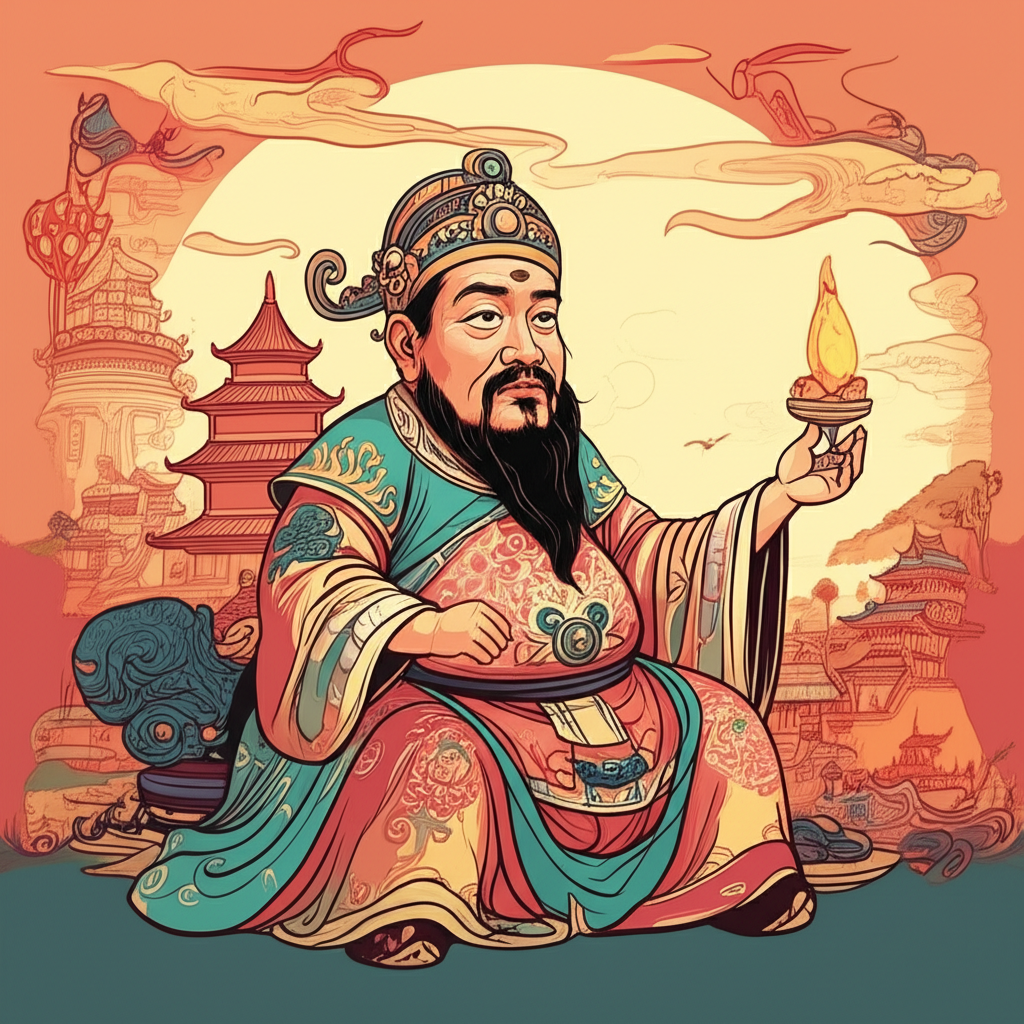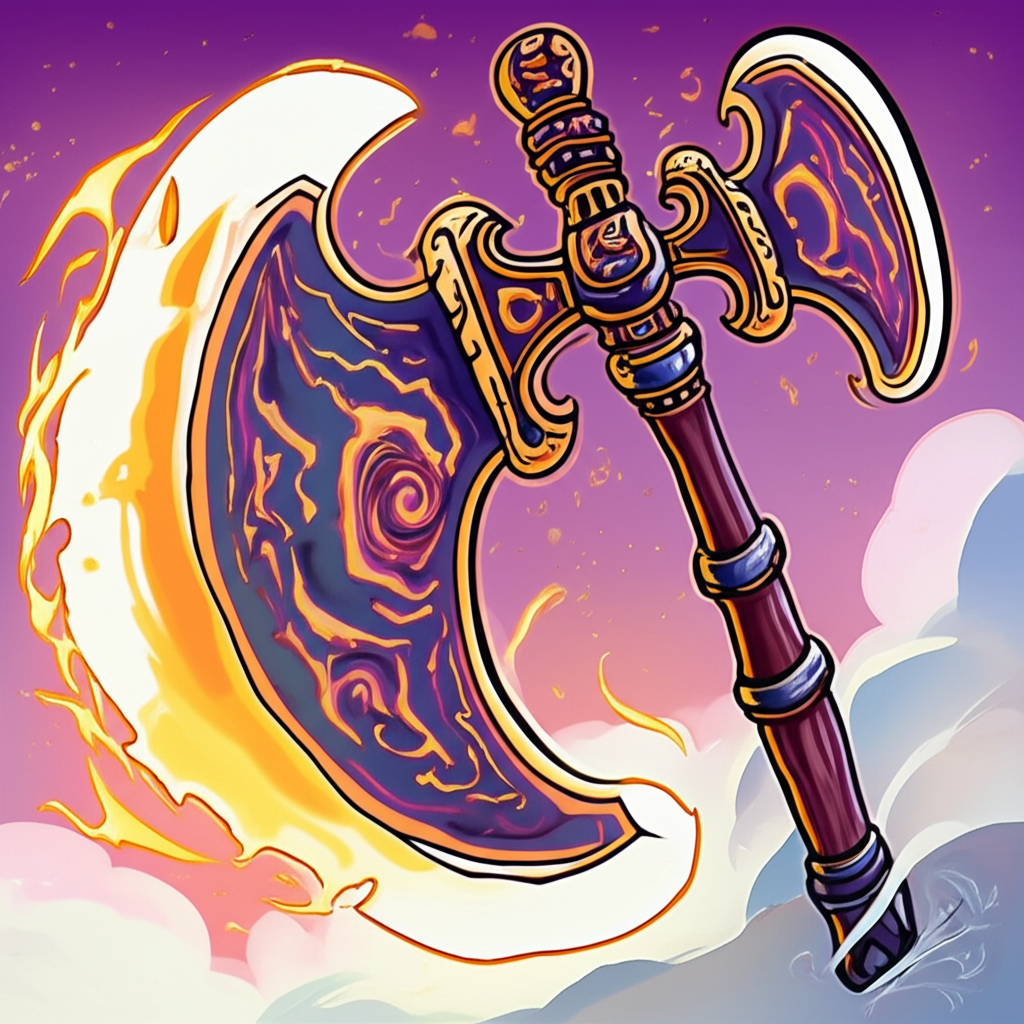
The Chronicle of the Jade Emperor and the Hidden City: A Myth of Virtue and Isolation
Disclaimer: The following article explores a story from traditional Chinese folklore. It is presented for cultural, historical, and educational understanding. This mythology is not real and is not meant to be believed, worshipped, or practiced.
Introduction
From the vast and ancient tapestry of Chinese mythology, a multitude of stories have been woven to explain the cosmos, morality, and the human condition. These tales, passed down through generations by storytellers, poets, and artists, offer a window into the worldview of a civilization that saw heaven and earth as intricately connected. One such narrative, a lesser-known but poignant legend, is the Chronicle of the Jade Emperor and the Hidden City. This traditional story, originating from the rich soil of Chinese folk religion and Taoist thought, explores profound questions about duty, purity, and the role of the virtuous in a flawed world. It is not a historical account but an allegorical journey into the heart of ancient wisdom.
Origins and Cultural Background
This legend finds its roots in a cultural era where the universe was perceived as a celestial empire, a perfect mirror of the imperial bureaucracy on Earth. During dynasties like the Tang and Song, when art, philosophy, and storytelling flourished, the concept of a cosmic order was paramount. The Chinese people of this time viewed the world through a lens of harmony and balance. Natural disasters, social unrest, and personal misfortune were often interpreted as signs of disharmony between heaven, earth, and humanity.
In this worldview, the heavens were governed by a pantheon of deities, immortals, and spirits, all organized under a supreme ruler. This structure provided a sense of order in a world that could often feel chaotic. The Emperor of China was known as the "Son of Heaven," his right to rule granted by a divine mandate. It was his duty to maintain harmony on Earth, just as his celestial counterpart maintained it in the cosmos. Stories like the one of the Hidden City were not just entertainment; they were vehicles for teaching Confucian values of duty, social responsibility, and the Taoist principle of living in accordance with the natural way (the Tao).
Character Description: The Jade Emperor (玉皇, Yù Huáng)
The central figure of this chronicle is the Jade Emperor, one of the most significant figures in the Chinese mythological pantheon. He is not depicted as a wrathful, thunder-wielding god of raw power, but rather as a wise, patient, and judicious celestial monarch. In traditional art, he is portrayed as a stately emperor, dressed in flowing imperial robes adorned with dragons and cosmic symbols, wearing a distinctive flat-topped crown with strings of jade beads (a mian’guan) that partially veil his face, symbolizing his impartiality and transcendent perspective.
Symbolically, the Jade Emperor represents the principle of ultimate justice, order, and cosmic governance. He is the grand administrator of the universe, presiding over a vast celestial court of ministries and departments that manage everything from rainfall and thunder to the records of human deeds. His power lies not in physical might, but in his profound wisdom and his authority to maintain the balance of the cosmos. In stories, he often acts as a supreme judge, testing the virtue of mortals and gods alike, his actions aimed at restoring harmony rather than dispensing arbitrary punishment.
Main Story: The Narrative Retelling
According to the legend, high in the celestial realm, the Jade Emperor sat upon his Dragon Throne, observing the mortal world below as a vast, living tapestry. Each thread represented a life, and its color and texture spoke of its virtue or corruption. For centuries, one particular thread had shone with a pure, silvery light that brought a rare smile to the Emperor’s serene face. This was the city of Lanying, the "Blue Shadow," a community nestled deep within an inaccessible mountain valley.
The people of Lanying were renowned for their unparalleled harmony. They lived simple lives dedicated to scholarship, art, and compassion. Their society was a perfect embodiment of order and virtue; there was no crime, no greed, and no conflict. The city’s light was a beacon, a testament to humanity’s potential for goodness, and its glow was visible even from the highest heavens.
But one day, the Jade Emperor looked down and saw that the light of Lanying was gone. The silvery thread had vanished from the tapestry, leaving a void. Alarmed, for the loss of such virtue was a grave omen, he dispatched his celestial messengers, the Star-Lords, to investigate. They returned with puzzling news: the city had not been destroyed by war or famine. It had simply disappeared, leaving behind only an empty valley shrouded in an impenetrable, memory-effacing mist.
Unwilling to accept this mystery, the Jade Emperor decided to descend to the mortal realm himself, a rare and momentous act. He veiled his divine radiance, taking the guise of a humble, wandering hermit with a dusty robe and a wooden staff. For years, he traveled the lands of men, seeking any trace or memory of the fabled city. He witnessed the world from which Lanying had vanished—a world of ambition, strife, and endless striving. He saw kingdoms rise and fall on the whims of proud rulers, and he saw common folk struggle with envy and desire. The contrast with the memory of Lanying was stark.
Finally, guided by an ancient instinct for cosmic balance, he found his way to the forgotten valley. The mists were thick, designed to turn away any who approached. But the Emperor, understanding the nature of things, did not fight the illusion. He simply sat at the valley’s edge, entered a state of profound stillness, and waited. He waited until the mists, which fed on intent and desire, found no ambition in him to repel and parted before him like a curtain.
There stood Lanying, untouched and serene, its pavilions and gardens as perfect as ever. But a strange stillness hung over it. The city elders, with long white beards and robes as pure as snow, came to greet him, their eyes holding centuries of placid wisdom. They recognized the aura of the stranger was not of the mortal world and bowed low.
"Why have you hidden yourselves?" the Jade Emperor asked, his voice calm but resonant with the weight of the cosmos.
The eldest scholar stepped forward. "Great Sage," he began, "we watched the world beyond our valley descend further into chaos. The ambition of men became a raging fire, their greed a bottomless sea. We saw that their corruption was a plague, and we feared it would one day infect our home. To preserve our purity, to protect this last bastion of harmony, we wove the mists of forgetting and severed our connection to the world. We chose to be a perfect memory rather than a tainted reality."
The Jade Emperor listened, his expression unreadable. He walked through the silent, orderly streets. He saw people painting, meditating, and reading, but he saw no children’s laughter, no passionate debate, no striving for something new. The city was a flawless, static jewel.
He returned to the elders and finally spoke. "You have succeeded in preserving your purity," he said, his voice echoing through the valley. "But you have failed in your purpose. Virtue is not a treasure to be hoarded in a hidden vault. It is a light that must be shone into the darkness to guide others. A candle that hides its flame in a sealed room illuminates nothing but its own prison. By isolating yourselves, you have abandoned the world you were meant to inspire. Your harmony has become sterile."
He did not punish them. Instead, he rendered his judgment. "You have made your choice," he declared. "And so you shall remain. Hidden. Forgotten. A legend whispered on the wind, a cautionary tale for those who believe that goodness can thrive in isolation."
With that, the Jade Emperor turned and departed. The mists swirled shut behind him, sealing Lanying away from the world forever. It remained a perfect, hidden city, but its light was never seen in the heavens again.
Symbolism and Meaning
For the ancient people who told this story, the Chronicle of the Jade Emperor and the Hidden City was a powerful allegory.
- The Jade Emperor symbolized the ideal of wise and just leadership. His response was not one of anger but of profound, instructive sorrow. He represented the cosmic principle that virtue must be active, not passive.
- The Hidden City of Lanying represented the utopian ideal, but also the temptation of escapism and moral purism. Its decision to withdraw from the world was a critique of those who seek personal enlightenment or purity without a sense of social responsibility.
- The Central Moral: The story served as a lesson on the nature of virtue. It argued that true goodness is not achieved by avoiding corruption but by engaging with the world and striving to make it better. It was a mythological reinforcement of the Confucian ideal of civic duty and the Mahayana Buddhist concept of the Bodhisattva, an enlightened being who delays their own nirvana to help others.
Modern Perspective
Today, the Jade Emperor remains a prominent figure in East Asian culture, though his portrayal varies. In adaptations of the classic novel Journey to the West, he is often shown as a well-meaning but sometimes frustrated and overly bureaucratic ruler. In modern films, television series, and video games like Smite, he is depicted as a powerful celestial sovereign.
The theme of a hidden, perfect city is a timeless archetype found in cultures worldwide, from Shangri-La to El Dorado. The legend of Lanying can be seen as a unique interpretation of this trope, one that critically examines the utopian impulse itself. In a modern context, the story resonates with contemporary debates about isolationism versus globalism, and the responsibility of privileged or enlightened individuals and communities toward the wider world.
Conclusion
The Chronicle of the Jade Emperor and the Hidden City is, ultimately, a product of folklore—a vessel for the cultural values, philosophical questions, and imaginative spirit of ancient China. It is a testament to the power of storytelling to explore complex moral dilemmas. While we appreciate these narratives for their cultural and historical richness, as Muslims, we recognize that only Allah is the true Creator and Sustainer, the sole source of all wisdom and justice.
Myths like this one are not a reflection of reality but a reflection of humanity’s enduring quest for meaning, order, and purpose. They are a cherished part of our global cultural heritage, reminders of how our ancestors used the power of imagination to make sense of their world and to teach the generations that would follow. Through these ancient tales, we can better understand the past and the timeless human traditions of storytelling.



